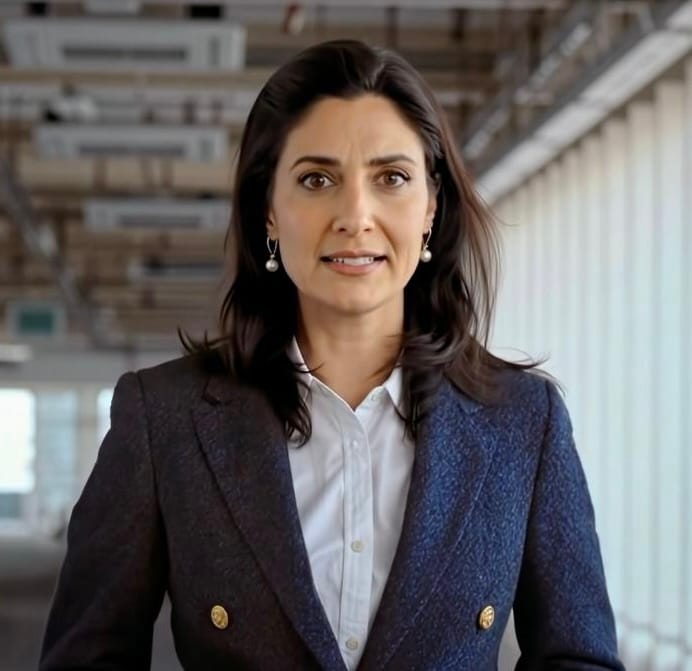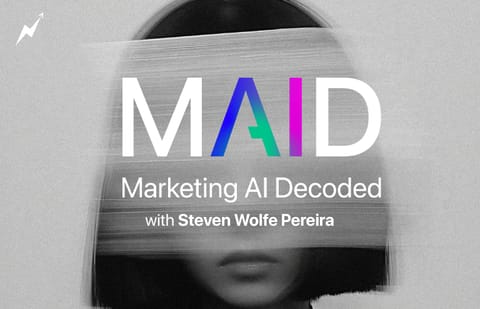Issue 92: A Bulletin for Big Ideas and Better Business
AI is raising big questions - we’ve built something to help you answer them.
ISSUE 92/
A BULLETIN FOR
BIG IDEAS AND
BETTER BUSINESS.

OPINION / AI
No humans were harmed in the making of this film
💬 Sir John Hegarty
A line that once felt like a tongue-in-cheek nod to Hollywood stuntmen may soon become a serious declaration in the creative industries. Channel 4’s latest documentary, fronted entirely by an AI-generated presenter, has shown us something we’ve long sensed was coming. No camera crew. No retakes. No presenter, at least not in the traditional sense. Just a synthetic construct, trained to mimic presence and perform delivery. It’s slick, it’s fascinating, and it asks a bigger question: are we about to witness the slow fading of human fingerprints in creative work? |  Photo by Channel 4 |
Are we about to witness the slow fading of human fingerprints in creative work?
Maybe that’s where we’re heading. Maybe credits will soon come with a breakdown of how much AI was used. 40% machine. 60% editor. Copyright lawyers will have a field day. And valuable media companies - the ones who spend millions on IP - won’t want to risk it. Disney, tellingly, has already set firm restrictions on the use of generative AI. That may reflect regulatory caution - or a deeper desire to protect and prioritise creativity itself.
Of course, the tech giants would prefer we didn’t ask these questions. They’ve moved fast, as they always do. Brushing aside legal frameworks with the same disregard Napster once showed to music rights. We all know how that ended. For every leap forward, there’s a reckoning that follows. You can’t rewrite the creative process without rethinking responsibility.
You can’t rewrite the creative process without rethinking responsibility.
So yes, Channel 4’s documentary is a sign of things to come. Not just in how we produce content, but in how we assign value. Recognition will be demanded, not assumed. That’s going to make end credits more interesting. Not just who made the work - but what. And when it says, no humans were harmed in the making of this film, what it really means is: none were needed.
Which brings us to now. We are standing on the threshold of something seismic. The tools are evolving fast. The roles are shifting. But creativity still carries a very human signature - a way of seeing, feeling, deciding. The presence of judgement, of taste. You can’t write an algorithm for that.
Creativity still carries a very human signature - a way of seeing, feeling, deciding.
Next month we launch MAID - Marketing AI Decoded. A six-week masterclass for leaders who want to understand, apply, and lead with AI in the Intelligence Era. It's being led by Steven Wolfe Pereira, someone who brings a rare clarity to this conversation. The course is designed to equip you with a new kind of intelligence - not artificial, but creative. Not just faster thinking, but better judgement in a fast-changing world.
So when you next read that line - no humans were harmed - ask what the work would have become if they were.

Marketing AI Decoded is an 8-part course for marketers, brand builders, and business leaders who want a clearer view of what AI means for their work. Created and led by Steven Wolfe Pereira, it offers clarity in a world of confusion - and a practical path forward.
Across six weeks, Steven focuses on how AI is being used in modern marketing: to build stronger brands, unlock growth, and lead meaningful change.
Learn more at marketingaidecoded.com

Unlock your creativity.
Has this newsletter
been forwarded to you by a friend?
Sign up to The Business of Creativity
to receive your own weekly dose
of creativity news.
